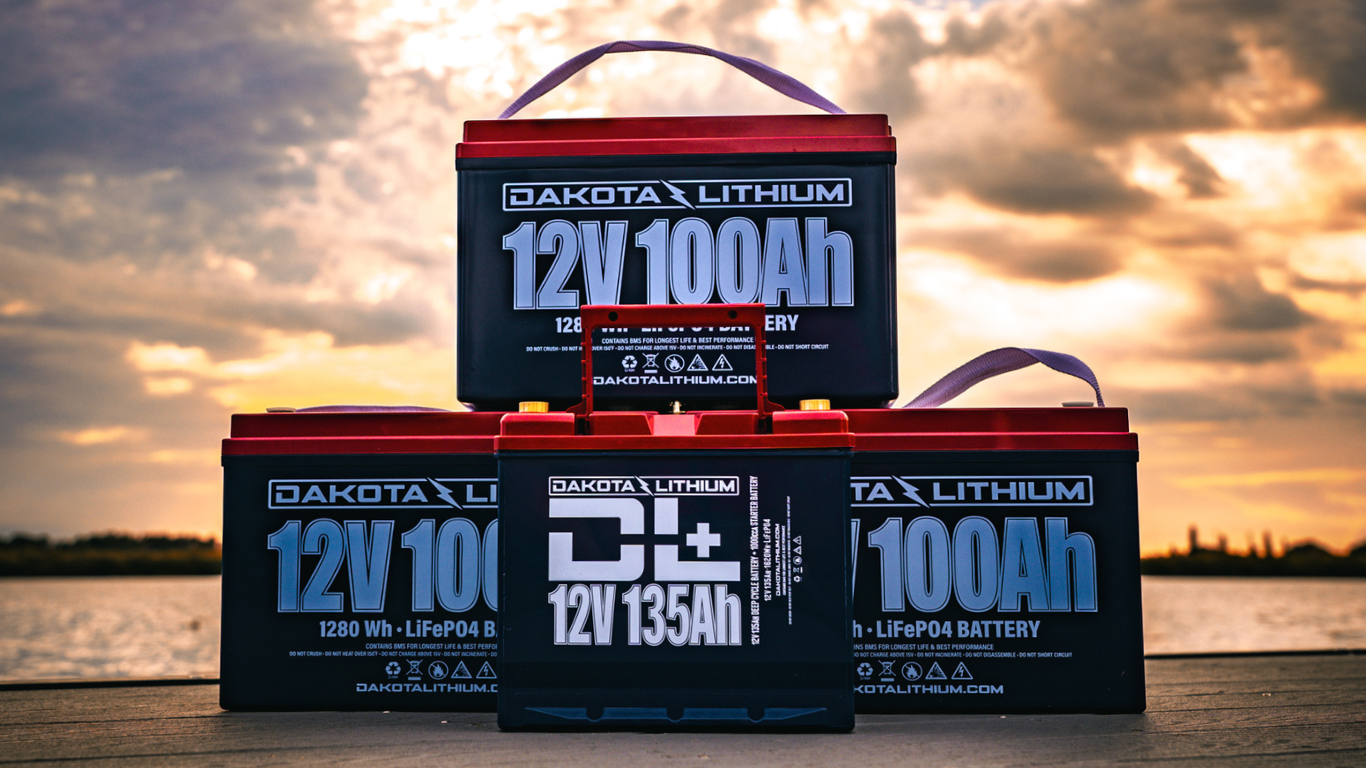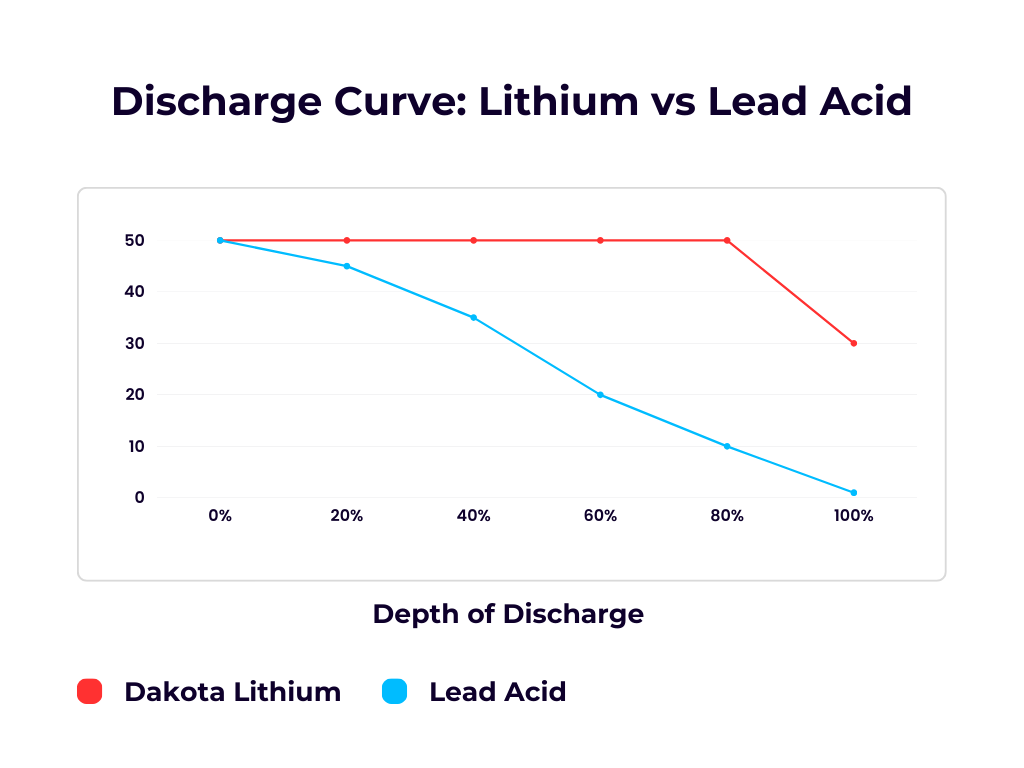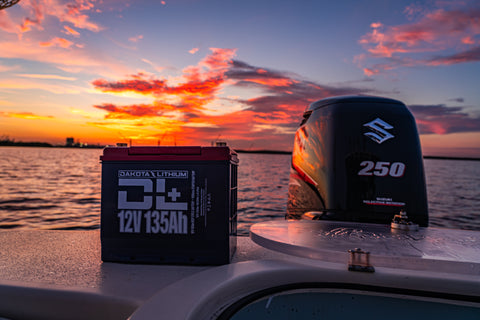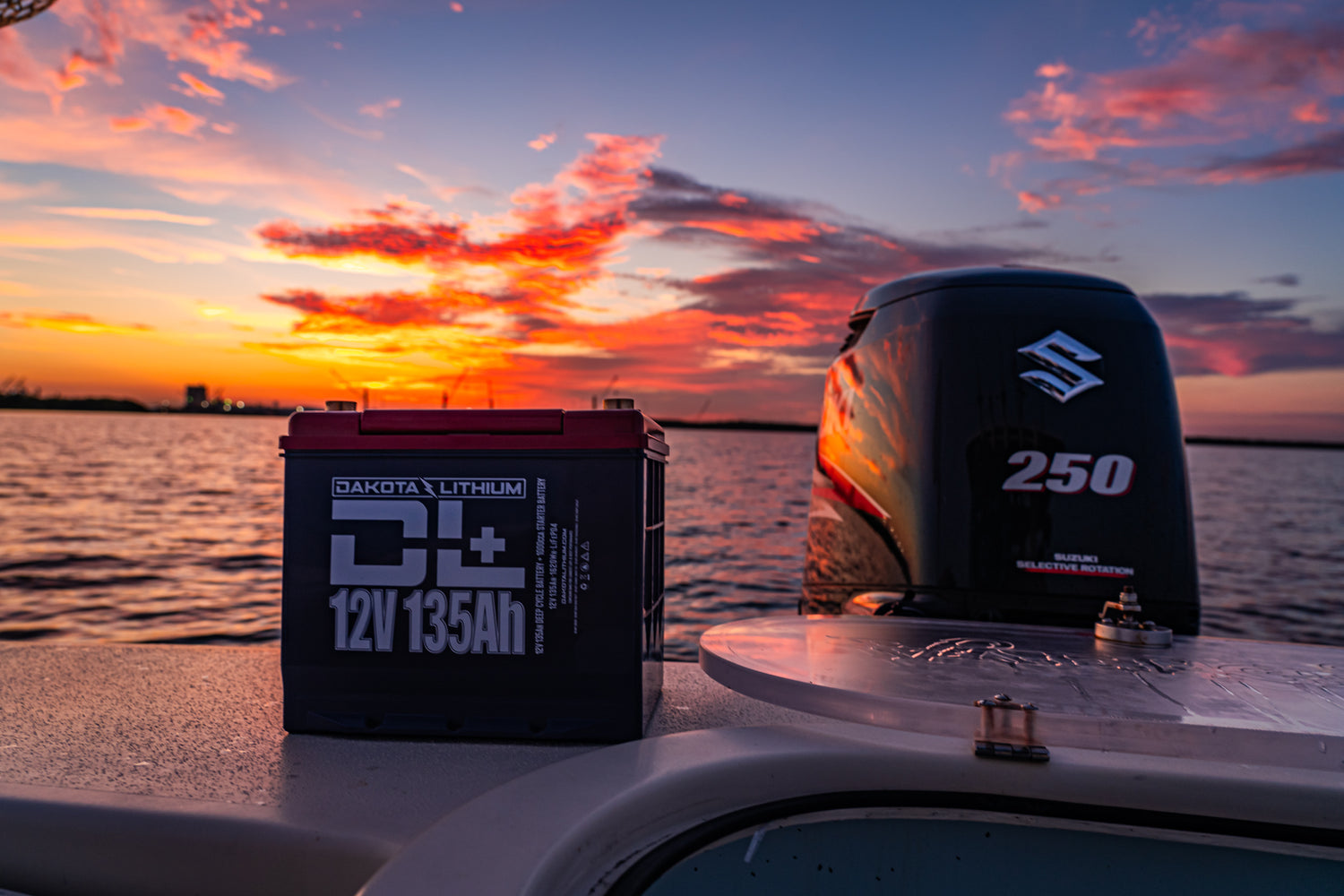
Whether you’re a lone angler or you run fishing charters in Tampa, you have numerous options for boat batteries and powering your essential equipment. As with any industry, as technology advances, so does the possibility of better performance and greater and longer enjoyment of your hobby or commercial venture. Technological evolution introduced the lithium battery in the 1970s and many owners, Salty Scales included, are converting their fishing boats to lithium batteries from traditional batteries (lead-acid and AGM Absorbent Glass Mat).
The main reasons for this are:
More power: Lithium batteries have up to two times the power of traditional batteries so you can run longer and harder.
Consistent voltage: As a lead acid battery is discharged (used), voltage drops. Lithium batteries have a flat voltage curve so voltage is steady and consistent until the battery is fully discharged.
Faster charging: Lithium batteries charge much faster than traditional batteries. A lead-acid battery may take 10 hours compared to three hours for a lithium battery.
Longevity: Lithium batteries may have a bigger upfront cost but they last significantly longer than other types of battery.
Handling: Weight and therefore balance can impact the performance of a boat – acceleration, fuel economy, top-end speed etc. Lithium batteries are up to half the weight of traditional batteries and this means significant improvements in boat handling.
More Eco-friendly: Lithium batteries are easier to dispose of because they don’t contain heavy metals like lead and cadmium. As a business reliant on a healthy natural environment, this is an important consideration for Salty Scales.
As a consumer, it pays to understand exactly what your cash is getting you so before you decide to upgrade your equipment to lithium batteries get in the know.

What Are Lithium Batteries?
Although they work on the same principle, the difference between a lithium battery and a lead-acid battery is in the materials used. The components of a battery are a cathode, anode, separator, electrolyte and a positive and negative collector. In a lead-acid battery, the anode is made from lead and the cathode from lead oxide. In a lithium battery, the anode is made from carbon and the cathode is the source of the lithium ions and this determines the capacity and voltage of the battery. The lithium ions are stored in the anode when the battery is charged.
What is a Lithium-Ion Battery?
Lithium-ion batteries were developed through the need for rechargeable lithium batteries. Lithium batteries are what are known as primary cells. Once their charge is all used up, that is it. It has no purpose because it has no power. A lithium-ion battery is a secondary cell construction. It uses the reduction of lithium ions to store energy and is rechargeable and can be used over and over again.
Lithium batteries are still produced because, even though they are not rechargeable, they have many advantages over traditional batteries, as explained above.
Interestingly, if unused, a lithium battery lasts longer than a lithium-ion battery. A lithium-ion battery has a shelf-life of two to three years, whereas a lithium battery will last for 10 -12 years, retaining its charge.
What is a LiFePO4 Battery?
LiFePO4 is the next evolution in lithium batteries. LiFePO4 stands for lithium iron phosphate battery and is also known as LFP battery (lithium ferrophosphate). LiFePO4 batteries have advantages over lithium-ion batteries.
While they share some similarities, LiFePO4 batteries have a different chemical composition which gives better performance and longevity. They have improved discharge and charged efficiency, a longer lifespan, are more lightweight, and require no maintenance to extend their service life but importantly, they have increased thermal stability and enhanced safety.
LiFePO4 batteries are more expensive but are a better investment thanks to their longevity and zero maintenance.
Why LiFePO4 Batteries Are Better for Fishing Boats
Batteries handle two crucial tasks on your fishing boat. Batteries start the engine and run all electrical loads which includes the lights and the radio. Manufacturers, boat owners and fishing charters in Tampa are making the transition from flooded lead-acid batteries to lithium-ion batteries to gain all the advantages of LiFePO4 technology.
We’ve discussed above the benefits of LiFePO4, but how do these, as well as the benefits of lithium batteries in general, translate to advantages for fishing boats?
High Energy Density: Although relatively small and lightweight, LiFePO4 batteries can store a significant amount of energy. This high energy density is particularly important for boats where space and weight are at a premium.
Lightweight: LiFePO4 batteries are significantly lighter than traditional lead-acid batteries of equivalent capacity. Reducing the weight of the battery can improve the overall performance and efficiency of the fishing boat, including speed and fuel economy.
Longer Cycle Life: Compared to traditional batteries, LiFePO4 batteries have a much longer cycle life. They can endure a higher number of charge-discharge cycles, typically over 2000 cycles, while lead-acid batteries are generally limited to a few hundred cycles. This means LiFePO4 batteries last much longer, reducing the need for frequent replacements.
Fast Charging: LiFePO4 batteries can accept high charge currents, which allows for faster charging times. This can be crucial for fishing boats that need to recharge quickly between trips or during downtime.
Voltage Stability: LiFePO4 batteries maintain a stable voltage throughout the discharge cycle. This means that the boat's electrical systems and equipment will receive consistent power, which is essential for sensitive electronics and trolling motors.
Deep Discharge Tolerance: LiFePO4 batteries can be safely discharged to a lower state of charge compared to lead-acid batteries without suffering damage. This is important for boats that may require long periods of continuous use without recharging.
Maintenance-Free: LiFePO4 batteries are virtually maintenance-free. Unlike lead-acid batteries that require periodic maintenance such as checking water levels and cleaning terminals, LiFePO4 batteries do not require such attention.
Environmental Friendliness: Because they do not contain toxic materials like the heavy metals lead and or cadmium, LiFePO4 batteries are easier to recycle. This gives them the consideration of being more environmentally friendly than lead-acid batteries.
Reliability: LiFePO4 batteries are known for their reliability and safety. They have a lower risk of overheating, thermal runaway, or explosion compared to some other lithium-ion chemistries.
Temperature Performance: LiFePO4 batteries perform well over a wide range of temperatures, making them suitable for use in various weather conditions often encountered in fishing.

The Reasons We Chose Dakota Lithium Batteries
Salty Scales chose Dakota because they are leading the industry in lithium batteries while maintaining great service and superior products.
Run Time: For most users how long a battery will last is the most important criterion. Compared to lead acid batteries, Dakota lithium batteries typically have double the run time of other batteries.
Longevity: Dakota batteries last up to five times longer than lead acid and AGM batteries. In many cases, this means only ever having to install batteries once rather than every few years as is required with lead acid batteries.
Consistent Capacity: The flat voltage curve of lithium iron phosphate means that voltage does not drop off during use – power (charge) is consistent and available when you need it. This is in contrast to deep cycle lead acid batteries where voltage can become too low to run anything when down to half capacity. 200 Ah lead acid batteries are needed compared to Dakota lithium 100 Ah battery.
Self-discharge: Self-discharge refers to how much power a lithium battery loses when it is not in use. In Dakota batteries, this rate is one-quarter that of a lead acid battery.
Low Weight: With a weight of 60% less than most deep-cycle lead acid batteries, Dakota batteries are easy to install and service. The lower weight also means greater maneuverability, more speed and less wear and tear.
Seasonality: Dakota batteries can be used all year round except in the most extreme conditions. The iron phosphate technology in Dakota’s lithium batteries means they are able to function at temperatures as low as minus 20°F (-29°C).
Solar Efficiency: Because the iron phosphate in Dakota lithium batteries are optimized to work with solar energy, 100% of the energy collected is usable. They are 50% more efficient than lead acid batteries.
Warranty: All Dakota batteries have an 11-year warranty, the highest in the industry.
How We Use Dakota Batteries at Salty Scales

We not only know the best places to drop lines and the best times of year to catch but also use the best equipment. The range of equipment is very wide from the rods and lines to the boat itself.
Where power is needed on the boat Captain Joshua Taylor uses for fishing charters, we have a relevant Dakota lithium. In 2023, we have upgraded to LiFePO4.
All of our boat accessories are on the new Dakota Lithium house battery. The DL+ 12V 135AH Dual Purpose 1000CCA Starter Battery Plus Deep Cycle Performance exceeds the standards for lithium battery use in boats and watercraft set by the American Boating and Yachting Council (ABYC). It gives us 100% reliability on starting the engine and with its continuous high discharge rate, the power to stay out on the water for longer. The house battery also powers the lights and the pumps.
For the trolling motor, we chose the Dakota Lithium 24V 100AH Deep Cycle Marine Trolling Motor Battery. We have three of them wired in a series and they will charge five times faster and have a charge cycle of 6000 to 10000 times (so much faster than a lead acid battery which might give you 250). This battery has twice the power, half the weight, and lasts four times longer than a sealed lead acid battery.
We’ve opted for Dakota LiFePro4 not only for the power and weight advantages and the longevity and reliability of charge but also for safety. Lithium phosphate batteries have a far superior safety record compared to lithium-ion batteries that have made news headlines all over the world for being dangerous.
Lithium-ion cells are not friendly in moisture-laden environments and there have been many reports of them spontaneously bursting into flames when being recharged particularly when used in Tesla cars and e-scooters. Lithium phosphate batteries are safe when met with water – an essential factor for a Tampa fishing charter business.
For the additional convenience of our customers, we have also installed a new mobile power station. The Dakota Powerbox +60 Power Station runs on a DL+12V 60 AH battery and is designed for use in extreme environments. Both waterproof and submersible, it’s also so light it floats. Crew and customers can charge small appliances and devices including cellphones, laptops, cameras, tools, TVs, portable fridges and even medical devices.
Now fully powered by Dakota, we’re confident Salty Scales charters will provide an even greater Tampa fishing experience. If you are shopping for new power for your boat, RV, or truck. We highly recommend that you take a more in-depth look at Dakota. The good folks over at Dakota have been very gracious to offer a 5% discount for all of our friends, it might not sound like much, but it can be a large savings on your new investment. Checkout Dakota Lithiums and you to will soon see the difference.
Checkout this in-depth video discussing why I upgraded to marine lithium batteries:




